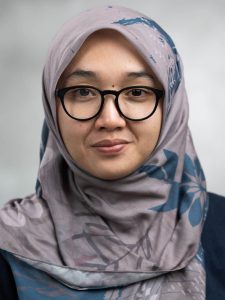Aulia Dini Rafsanjani
Graduate Student, Survey and Data Science Program
What is your area of research or expertise that you bring to the Landscapes collaboration?
I am a survey and data science student with a concentration in statistical science. My background was as a statistician, and I mainly worked with data collection about socioeconomic factors of farmer’s production in Indonesia. I brought the theoretical knowledge from my study and practical experience from my previous work on the survey and brought it into the Landscapes team.
What do you find challenging or exciting about interdisciplinary collaboration?
What excites me is that I can learn new things and meet new people. Working on interdisciplinary projects also broadens my understanding of how other people understand and tell the story from the data. The challenge is incorporating different perspectives to answer research questions because each discipline has its priorities and methodology.
What’s one common misconception about your area of research that you’d like to dispel?
Sampling may be a somewhat popular topic, but I want to promote stratification sampling to all social scientists since it reflects the principle of representativeness and unbiasedness in social research.
How did you become interested in structural racism and health?
I have a specific interest in learning about poverty and inequality. In my previous life, I understood the concept of inequality mostly from an income and geographical perspective. After joining this team, I deepened my knowledge to see inequality from a racial perspective related to America’s historical context. I am more excited to learn how inequality is measured in other countries.
What’s the academic path that brought you to where you are now, and what are your plans after graduation?
My motivation for pursuing a master’s study is to enhance my theoretical knowledge about surveys because I mainly worked on practical aspects of this field. I always dreamed of being a survey researcher, especially in the context of data collection in developing countries. Being a part of the Landscapes team is a priceless experience working on collaborative research projects.
If you had the opportunity to get one question answered by an omniscient being, what would you ask? (this is meant to be a lighthearted question–we’re trying to get to the heart of what you are most curious about, whether within your field of research or beyond! Feel free to think big!)
Why does inequality exist?
Anything else you want to share?
Thank you for providing the opportunity to be a collaborator spotlight. I am eager to give my best work to this team
